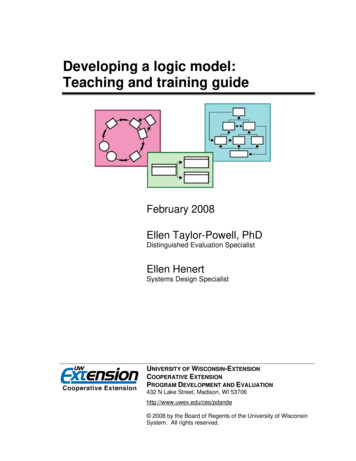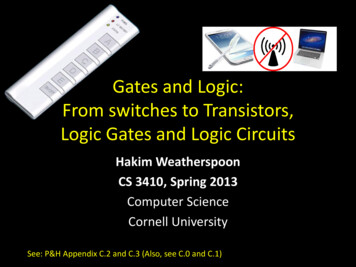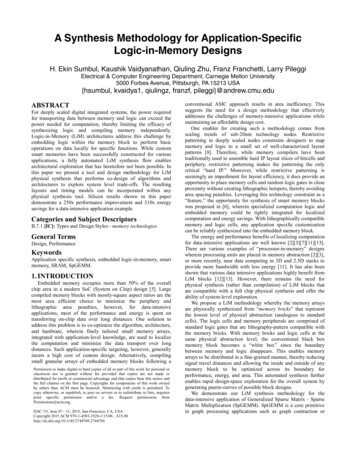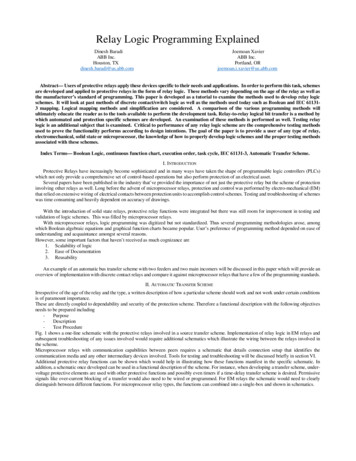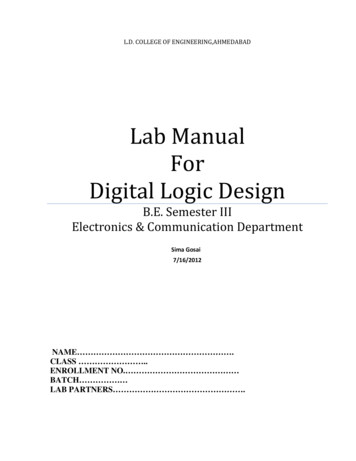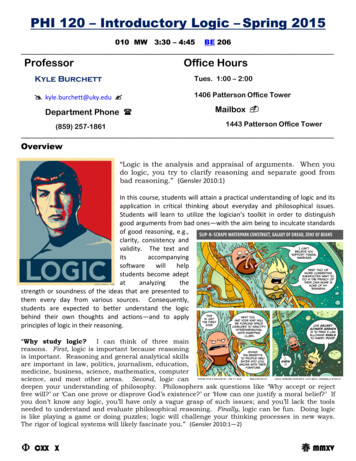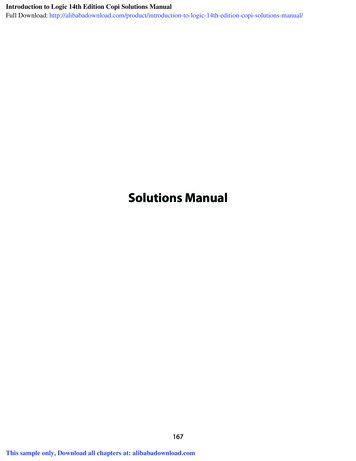
Transcription
Introduction to Logic 14th Edition Copi Solutions ManualFull Download: s Manual167This sample only, Download all chapters at: alibabadownload.com
PREFACEHere will be found a complete set of solutions to the exercises that appear at the end of sectionsand chapters in the Fourteenth Edition of Introduction to Logic. This (very sizable!) packet differsfrom the solutions manuals for earlier editions in the following important way: It is complete inthe sense that it includes (as earlier manuals did not) the solutions that are also provided at theback of the book itself, in “Solutions to Selected Exercises.”The formal proofs of validity of deductive arguments provided here are (for many exercises)neither the only ones nor the shortest ones possible. For some proofs of invalidity not all truthvalue assignments that could serve the same purpose are included.Many exercises cannot be said to have a single definitive solution. Where there are complications introduced by the possibility, or even the likelihood, of differing interpretations, we havegiven what seem to us to be the best answers. But our judgment will be disputable in somecases, and alternative analyses will often be plausible, sometimes perhaps superior. Ingeniousstudents often surprise one with a variety of alternative answers for which some justificationscan be supplied; it is surely proper to give credit for analyses and solutions that can be plausiblydefended.The responses to some exercises in Chapters 12 and 13, in addition to being subject to alternative interpretations, can be very lengthy, for which reason several models only are provided, inplace of an extensive discursive response to each exercise.It is nearly impossible, in work of this kind, to eliminate every flaw. We acknowledge with sincere thanks—and continue to welcome—improvements our readers may suggest. Especiallyvaluable are corrections of errors, for which we are grateful. Readers are invited to send corrections and suggestions of every sort to: ccohen@umich.eduI. M. C.C. C.K. M.169
CHAPTER 1Chapter 1Section 1.2 Identify premises and conclusionsExercises on pages 9–111.Premise: A well-regulated militia is necessary for the security of a free state.Conclusion: The right of the people to keep and bear arms shall not be infringed.2.Premises:(1) It’s easier (than photocopying) to buy your friend a paperback copy of a book.(2) A paperback copy of the book is inexpensive.Conclusion: What stops many people from photocopying a book and giving it to a pal isnot integrity but logistics.3.Premise: Human intelligence is a gift from God.Conclusion: To apply human intelligence to understand the world is not an affront to God,but is pleasing to him.4.Premise: Sir Edmund Hilary dedicated his life to helping build schools and hospitals forthe Sherpas who helped him to climb Mount Everest.Conclusion: He is, for that reason, a hero.5.Premises:(1) Standardized tests have a disparate racial impact, as illustrated by the difference inthe average scores of different ethnic groups.(2) Ethnic differences arise on all kinds of tests, at all levels.Conclusion: If a racial gap is evidence of discrimination, then all tests discriminate.6.Premise: Everybody thinks himself so abundantly provided with good sense that eventhose most difficult to please in all other matters do not commonly desire more of it thanthey already possess.Conclusion: Good sense is, of all things in the world, the most equally distributed.7.Premise: Any words new to the United States are either stupid or foreign.Conclusion: There is no such thing as the American language; there’s just bad English.171
Solutions Manual, Introduction to Logic, Fourteenth Edition8.Premise: In New York State alone taxpayers spent more than 200 million in a failed deathpenalty experiment, with no one executed.Conclusion: The death penalty is too costly.Premise: [There has been] an epidemic of exonerations of death row inmates uponpost-conviction investigation, including ten New York inmates freed in the last 18 monthsfrom long sentences being served for murders or rapes they did not commit.Conclusion: Capital punishment is unfair in its application, in addition to being toocostly.9.Premise: Houses are built to live in, not to look on.Conclusion: Use is to be preferred before [i.e., above] uniformity.10.Premises:(1) A boycott, although not violent, can cause economic harm to many.(2) The greater the impact of a boycott, the more impressive is the statement it makes.(3) The economic consequences of a boycott are likely to be felt by innocent bystanders, who suffer loss of income because of it.Conclusion: The boycott weapon ought to be used sparingly.11.Premises:(1) In the early part of the 20th century forced population shifts were not uncommon.(2) In that period multicultural empires crumbled and nationalism drove the formationof new, ethnically homogenous countries.Conclusion: Ethnic cleansing was viewed not so long ago as a legitimate tool of foreignpolicy.12.Premises:(1) If a jury is sufficiently unhappy with the government’s case or the government’sconduct, it can simply refuse to convict.(2) This possibility puts powerful pressure on the state to behave properly.Conclusion: A jury is one of the most important protections of a democracy.172
CHAPTER 113.Premises:(1) Orangutans spend more than 95 percent of their time in the trees, which, along withvines and termites, provide more than 99 percent of their food.(2) Their only habitat is formed by the tropical rain forests of Borneo and Sumatra.Conclusion: Without forests, orangutans cannot survive.14.Premise: If God is omniscient, he must already know how he is going to intervene tochange the course of history using his omnipotence.Conclusion: God cannot change his mind about his intervention.Premise: God cannot change his mind about his intervention.Conclusion: If God is omniscient he is not omnipotent.Premise: If God is omniscient he is not omnipotent.Conclusion: Omniscient and omnipotence are mutually incompatible.15.Premises:(1) Reason never comes to the aid of spiritual things.(2) More frequently than not, reason struggles against the divine Word, treating all thatcomes from God with contempt.Conclusion: Reason is the greatest enemy that faith has.Section 1.4 Arguments and ExplanationsExercises on pages 20–241.This is essentially an explanation. Whatt is being explained is the fact that humans havevarying skin colors. The explanation is that different skin colors evolved as humans cameto live at different distances from the Equator and hence needed different degrees of protection from the rays of the sun. One might interpret the passage as an argument whoseconclusion is that skin color is not a permanent trait of all humans. Under this interpretation, all the propositions preceding the final sentence of the passage serve as premises.2.This is an argument, whose conclusion is that the victories of American labor throughthe passage of ostensibly neutral laws regulating labor, were seriously adverse to theinterests of blacks, and resulted in the now longstanding gap between black and whiteunemployment rates. One might interpret the passage simply as an explanation, in173
Solutions Manual, Introduction to Logic, Fourteenth Editionwhich what is being explained is that gap, but this interpretation leaves aside the manyramifications of the argument.3.This is an explanation. Whatt is being explained is why sex feels good. The explanation isthat those animals in which it does feel good have more offspring, and therefore moreevolutionary success, than those animals in which sex does not so effectively motivate. Ifwe did not know that sex feels good, this might be considered an argument to show thatit does; but since the pleasure of sex is a fact not in serious question here, the passage isbest viewed as an explanation of that reality.4.This is an argument. Its premises are that (1) changes are real and (2) changes are onlypossible in time. The conclusion is that time must be something real.5.This may be interpreted either as an explanation or as an argument. Viewed as an explanation, whatt is being explained is the fact, not doubted here, that the nursing shortage hasturned into a crisis. The explanation of that fact is a combination of observations, includingthe fact that fewer young people are going into nursing, that many older nurses are on theverge of retirement, that nurses often report high rates of job dissatisfaction and plan toleave the profession, and that hospitals routinely cancel or delay surgical cases because ofa lack of nursing staff. Viewed as an argument, all these factors are premises supporting theconclusion that the shortage of nurses has indeed turned into a crisis.6.This is an argument. Dewey is calling attention to the fact that to show what caused anevent is not sufficient to justify it or to condemn it, because justification or condemnationcomes (in his view) only through the consequences of the event, not its origin.7.This passage is mainly an argument, whose conclusion is that a king cannot be subject tohis own laws. Its premises are: (1) it is impossible to bind oneself in any matter which isthe subject of one’s own free exercise of will, and (2) the laws are no more than the product of the king’s free will. The passage also serves as an explanation of the words commonly used in completing edicts and ordinances of a king: “for such is our good pleasure.”This reinforces the argument above, since the king plainly cannot be bound by that whichis determined only by his own good pleasure.8.This is a bit of Oscar Wilde’s humor that can be interpreted in various ways—as a sardonicargument attacking Wagner’s music, perhaps, or as a lighthearted explanation of Wilde’shidden pleasure in that music. Or perhaps there is nothing seriously intended in the passage at all!9.Although this could be viewed as an argument, it was very probably intended by the author as an explanation of the increased likelihood of cheating, that explanation consistingof the enumeration of several aspects of contemporary American society.174
CHAPTER 110.This is an explanation. Whatt is explained is the fact that Cupid has been traditionallypainted as blind. The explanation is that love, which Cupid represents, does not look withthe eyes and therefore does not see.11.This may be viewed either as an explanation or as an argument. If one takes the reportedsuggestion (that it is greater sexual selection pressure on women that accounts for theirquantity of body hair) as true or known to be highly probable, then this passage is a moredetailed explanation of how this came to pass. If, on the other hand, one takes the conclusion (that the lesser amount of body hair on women is due to sexual selection pressure)as in genuine doubt, then this passage may be interpreted as an argument in support ofthat conclusion. Of the two interpretations, the former seems the more plausible.12.This is an argument whose conclusion is that the threat of nuclear war is useless againstIranian president Mahmoud Ahmadinejad. The premises are: (1) Iran’s leaders do not careabout killing their people in great numbers. (2) Ahmadinejad is a religious fanatic. (3) Tosuch a fanatic, dying while fighting the enemy is a quick pass to heaven. (4) The mutuallyassured destruction that worked so well as a deterrent during the Cold War would insteadbe an inducement to war.13.This is an argument whose conclusion is that interesting life can exist only in three dimensions. The premises are that (1) blood flow and large numbers of neural connections cannot exist in fewer than three dimensions; and (2) stable planetary orbits are not possiblein more than three dimensions. [The argument makes the unstated assumption that theconditions described are necessary conditions for interesting life.]14.This is an argument; but the first sentence in the passage is background material andnot strictly a premise, although it is needed by the reader to understand the argumentthat follows immediately. After the conclusion (“we need them”) appears the traditionalQ.E.D.—which is the abbreviation for “quod erat demonstradum,” meaning “what was tobe demonstrated.”15.This is an argument. Its conclusion is that the Treasury Department has violated Section504 of the Rehabilitation Act. Its premises are: (1) The Department has failed to designand issue paper currency that is readily distinguishable to blind and visually impairedindividuals; and (2) [implied] this failure subjects blind and visually impaired persons todiscrimination under an activity by an Executive agency.16.This is an argument, whose conclusion is that acting in ways that fulfill one’s duty neverguarantees the moral goodness of the actor. The premise is that the act may be donefrom a motive that is indifferent or bad, and that the act may therefore be morally indiffferent or bad.175
Solutions Manual, Introduction to Logic, Fourteenth Edition17.This is an argument. Its conclusion is that belief in God is not beyond reason. Its premises are: (1) Only the supreme mind of God could create immutable and eternal laws.(2) Human reason can grasp some immutable and eternal laws, such as the circle or thesquare or the laws of physics. (3) In having that capacity, human reason must possess aninnate particle of the mind of God.18.This is an explanation. What is explained is the author’s unhesitating celebration of religious holidays, although he is an atheist. The explanation is that many such rituals didnot originate with Christian practices or beliefs, and that they really celebrate universalhuman goods and relationships.19.This is an argument. Its conclusion is that ethnic movements are “two-edged swords”—that is, they can serve good and evil ends. The premises are (1) the fact that such movements are often necessary to repair injured collective psyches, and (2) the fact that suchmovements often end in tragedy, especially when they turn political, as in Germany.20.This is an argument. Its conclusion is that it is false to say that all who are happy areequally happy. Its premises are: (1) happiness consists in the multiplicity of agreeableconsciousness, and (2) a peasant does not have the capacity for happiness that a philosopher does (presumably because a philosopher will have a greater multiplicity ofagreeable consciousness), and so cannot be equally happy,y although the peasant can beequally satisfied.176
CHAPTER 2Chapter 2Section 2.1Exercises on pages 36–381.Premise: The Detroit Pistons are an all-around better team than the San Antonio Spurs.Conclusion: The Pistons did not lose [the NBA finals, in 2005] because of lack of ability.Premise: The Pistons will beat the Spurs two out of every three times; and the Spurs willwin one out of every three times.Premise: The Pistons had won the 5th and 6th games of the series—two in a row—so if theyhad won the final game they would have won three out of three.Conclusion: The Pistons lost because of the law of averages.2.Premise: Universities have commonly been offering strange literary theories and assortedoddities, in place of the writing courses that ought to have been offered. Students havebeen shortchanged.Conclusion: Vast numbers of students cannot express themselves well in writing.3.Premise: People divided on ethnic lines tend not to adopt programs that will give mutualsupport.Conclusion (and premise of the following argument): Therefore nations that are racially diverse tend to have lower levels of social support than nations that are raciallyhomogenous.Conclusion: A welfare state with a racially diverse population is in tension, and the moreracially diverse a community is, the more difficult it is to maintain comprehensive welfareprograms.4.Premise: If freedom were a natural part of the human condition we could expect to findfree societies spread throughout human history.Premise: We do not find that, but instead find every sort of tyrannical government, fromtime immemorial.Conclusion: It is simply false to say (as Orlando Patterson does) that freedom is a naturalpart of the human condition.5.Premise: If future scientists find a way to signal back in time, their signals would alreadyhave reached us.177
Solutions Manual, Introduction to Logic, Fourteenth EditionPremise: No such signals have ever reached us.Conclusion: Future scientists never will find a way to signal back in time.6.Premise: Japanese and European whale-hunting countries have no need to eat whales;they can choose their diets.Premise: Eskimos live in an environment so harsh that their survival obliges them to eatwhales; they have no choice in dietary matters.Conclusion: Permitting primitive Eskimos to kill some whales for survival, while at thesame time demanding that modern societies cease to hunt whales, is fair and reasonable,not hypocritical.7.Premise: The number of atoms in all of space is so huge that we can never count them orcount the forces that drive them in all places.Conclusion: There must be other worlds, in other places, with different kinds of men andanimals.8.Premise: Where marriages are prearranged, divorce rates are often very low.Premise: Where marriages are formed on the basis of romantic love, divorce rates arevery high.Premise: You can come to love a person you married without love.Premise: You can fall out of love with a person you married for love (or the marriagecan fail).Conclusion (unstated): We ought not suppose that romantic love is a necessary precondition of successful marriage.9.Premise (unstated): Our tax system depends upon the willingness of persons to pay thetaxes they owe.Premise: That willingness depends, in turn, upon the widespread belief that almost everyone, including competitors and neighbors, are also paying the taxes they owe.Conclusion: If the Internal Revenue Service (the IRS) cannot assure us that this fairnessis reasonable for us to suppose, the entire system of voluntary tax payments is seriously(and perhaps irremediably) threatened.178
CHAPTER 210.Premise: People and government are obsessed with racism and talk about it endlessly.Premise: But we don’t listen and we don’t see, and therefore we remain in a state of denial,thinking ourselves absolved of all complicity in racism.Conclusion: Invariably we conclude that it is the other guy who is in the wrong.Section 2.2 – AExercises on pages 43–451.In a recent attack upon the evils of suburban sprawl, the authors argue as follows:The dominant characteristic of sprawl is that each component of a community—housing, shoppingcenters, office parks, and civic institutions—is segregated, physically separated from the others, causingthe residents of suburbia to spend an inordinate amount of time and money moving from one place tothe next. And since nearly everyone drives alone, even a sparsely populated area can generate the trafficof a much larger traditional town.SolutionM The dominant characteristic of sprawl is that each component of a community—housing, shopping centers, office parks, and civic institutions—is segregated, physically separated from the others, causing N the residents of suburbia to spend an ordinate amountof time and money moving from one place to the next. And since O nearly everyonedrives alone, P even a sparsely populated area can generate the traffic of a much largertraditional town.179
Solutions Manual, Introduction to Logic, Fourteenth Edition2.M At any cost we must have filters on our Ypsilanti Township library computers. NPornography is a scourge on society at every level. O Our public library must not be usedto channel this filth to the people of the area.3.M At his best, Lyndon Johnson was one of the greatest of all American presidents. N Hedid more for racial justice than any president since Abraham Lincoln. O He built moresocial protections than anyone since Franklin Roosevelt. P He was probably the greatestlegislative politician in American history. Q He was also one of the most ambitious idealists. h Johnson sought power to use it to accomplish great things.4.M Married people are healthier and more economically stable than single people, andN children of married people do better on a variety of indicators. O Marriage is thus asocially responsible act. P There ought to be some way of spreading the principle of support for marriage throughout the tax code.180
CHAPTER 25.M Vacuum cleaners to ensure clean houses are praiseworthy and essential in our standard of living. N Street cleaners to ensure clean streets are an unfortunate expense. Partlyas a result O our houses are generally clean and P our streets generally filthy.6.M We are part of Europe. N It affects us directly and deeply. Therefore O we should exercise leadership in order to change Europe in the direction we want.7.M California’s “three strikes and you’re out” law was enacted 10 years ago this month(March 2004). N Between 1994 and 2002, California’s prison population grew by 34,724,O while that of New York, a state without a “three strikes” law, grew by 315. P Yet during181
Solutions Manual, Introduction to Logic, Fourteenth Editionthat time period New York’s violent crime rate dropped 20 percent more than California’s.Q No better example exists of how the drop in crime cannot be attributed to draconianllaws with catchy names.8.M No one means all he says, and yet N very few say all they mean, for O words are slippery and P thought is viscous.9.M The first impression becomes a self-fulfilling prophesy: N we hear what we expect tohear. O The interview is hopelessly biased in favor of the nice.182
CHAPTER 210.M No government can ever guarantee that the small investor has an equal chance ofwinning. N It is beyond dishonest to pretend that rules can be written to prevent futurefinancial scandals. O No set of regulations can ensure fairness and transparency in the[securities] markets.Section 2.2 – BExercises on pages 45–48Solution1.M An outstanding advantage of nuclear over fossil fuel energy is how easy it is to dealwith the waste it produces. N Burning fossil fuels produces 27,000 million tons of carbon dioxide yearly, enough to make, if solidified, a mountain nearly one mile high witha base twelve miles in circumference. O The same quantity of energy produced fromnuclear fission reactions would generate two million times less waste, and it would occupy a sixteen-meter cube. P All of the high-level waste produced in a year from anuclear power station would occupy a space about a cubic meter in size and would fitsafely in a concrete pit.183
Solutions Manual, Introduction to Logic, Fourteenth Edition2.Premise: Economic inequality is correlated with political instability.Premise: Economic inequality is correlated with violent crime.Premise: Economic inequality is correlated with reduced life expectancy.Premise: Simple justice is offended when chief executives are paid hundreds of timesmore than is paid to ordinary employees.Conclusion: We should be gravely concerned about economic inequality—the wealthgap.3.M Genes and proteins are discovered, not invented. N Inventions are patentable, discoveries are not. Thus, O protein patents are intrinsically flawed.4.Premise: A growing number of Japanese don’t want to eat whale meat.Conclusion: More and more Japanese consumers won’t buy whale meat.Premise: If the Japanese won’t buy whale meat, the Japanese whaling industry is in serious trouble and is probably doomed.Conclusion: The Japanese whaling industry is in serious trouble, and is probably doomed.5.Premise: Without the memory of past horrors, there can be no justice for us. [Sin memoria,no hay justicia].Premise: Without justice , there will be no future for us. [Sin justicia, no hay futuro].Conclusion (unstated): If we do not remember the horrors of the past we will have nofuture. [Sin memoria, no hay futuro].184
CHAPTER 26.Since M Grover Cleveland has a terrific public record, but a blemished private life, andsince N his opponent, James G. Blaine, has a storybook private life but a checkered publicrecord, O it would be well to put both where they perform best. P Let’s return Blaine toprivate life, and keep Cleveland in public life.7.M World War II solved problems called Nazi Germany and militaristic Japan, and createdalliances with the nations we crushed. N The Revolutionary War solved the problem oftaxation without representation, and created the United States of America. O The PersianGulf War solved the problem of the Iraqi invasion of Kuwait. P The Civil War solved theproblem of slavery. Q It is false to say that wars create problems but do not solve them.R These wars created a better world. S War is the only way to defeat evil enemies withwhom there is no reasoning; it’s either us or them. T What creates true peace is victory.185
Solutions Manual, Introduction to Logic, Fourteenth Edition8.Premise: He who disobeys the laws is in effect disobeying his parents.Premise: He who disobeys the laws defies the authors of his education, to whom so verymuch is owed.Premise: He who disobeys the laws violates the agreement that he made, explicitly ortacitly, that he would obey the laws’ commands.Conclusion: He who deliberately disobeys the laws is thrice wrong.9.M The reality is that money talks. N Court officers, judges, and juries treat private lawyersand their clients differently from those who cannot pay for representation. O Just as better-dressed diners get prime tables at a restaurant, human nature dictates better resultsfor those who appear to have money.10.Premise: When Morton Grove, Illinois, passed a law banning guns, Kennesaw, Georgia,passed a law making gun ownership mandatory.Premise: Criminals would rather break into a house where they are not at risk of being shot.Premise: Kennesaw’s crime rate dropped sharply, but Morton Grove’s did not.Conclusion:A) Criminals will naturally believe that towns like Kennesaw, with such laws on their books,are very unsympathetic to them, and that if they plan to engage in crime they will be better off elsewhere. B) We are likely to see other communities adopting similar mandatorygun-ownership laws for self-protection.186
CHAPTER 2Section 2.3Exercises on pages 52–531.A question arises: whether it is better [for a prince] to be loved than feared or feared thanloved? One should wish to be both, but, because M it is difficult to unite them [beingloved and being feared] in one person, N it is much safer to be feared than loved, when,of the two, one must be dispensed with. Because O this is to be asserted in general ofmen, that they are ungrateful, fickle, false, cowards, covetous. and P that prince who,relying entirely on their promises, has neglected other precautions, is ruined, because Qfriendships that are obtained by payments may indeed be earned but they are not secured, and in time of need cannot be relied upon. R Men have less scruple in offendingone who is beloved than one who is feared, for S love is preserved by the link of obligation which, T owing to the baseness of men, U is broken at every opportunity for theiradvantage; V but fear preserves you by ེ a dread of punishment which never fails.187
Solutions Manual, Introduction to Logic, Fourteenth Edition2.M Democratic laws generally tend to promote the welfare of the greatest possible number; for N they emanate from the majority of the citizens, who are subject to error, butwho cannot have an interest opposed to their own advantage. O The laws of an aristocracy tend, on the contrary, to concentrate wealth and power in the hands of the minority;because P an aristocracy, by its very nature, constitutes a minority. It may therefore beasserted, as a general proposition, that Q the purpose of a democracy in its legislation ismore useful to humanity than that of an aristocracy.3.“ You appeared to be surprised when I told you, on our first meeting, that you had comefrom Afghanistan.”“You were told, no doubt.”“Nothing of the sort. I kneww you came from Afghanistan. From long habit the train ofthoughts ran so swiftly through my mind that I arrived at the conclusion without beingconscious of intermediate steps. There were such steps, however. The train of reasoningran, M ’Here is a gentleman of medical type, but N with the air of a military man. ClearlyO an army doctor, then. P He has just come from the tropics, for Q his face is dark, andR that is not the natural tint of his skin, for S his wrists are fair. T He has undergonehardship and sickness, as U his haggard face says clearly. V His left arm has been injured.ེ He holds it in a stiff and unnatural manner. ཻ Where in the tropics could an Englisharmy doctor have seen much hardship and got his arm wounded? Clearly in Afghanistan.’The whole train of thought did not occupy a second. I then remarked that you came fromAfghanistan, and you were astonished.”“It is simple enough as you explain it,” I said, smiling.188
CHAPTER 24.M Nothing is demonstrable unless the contrary implies a contradiction. N Nothing thatis distinctly conceivable implies a contradiction. O Whatever we conceive as existent, wecan also conceive as nonexistent. P There is no being whose nonexistence, therefore, implies a contradiction. Consequently Q there is no being whose existence is demonstrable.Challenge to the Reader: Prop 29, Book I, Ethics Geometrically Demonstrated,d B. SpinozaM Whatever is, is in God. N But God cannot be called a contingent thing, for O He exists necessarily and not contingently. Moreover, P the modes of the divine nature [the creations whichdepend on, or have been created by, God immediately] have followed from it necessarily and189
Solutions Manual, Introduction to Logic, Fourteenth Editionnot contingently. But Q God is the cause of these modes not only in so far as they simplyexist, but also in so far as they are considered as
Introduction to Logic 14th Edition Copi Solutions Manual . Solutions Manual, Introduction to Logic, Fourteenth Edition 174 which what is being explained is that gap, but this interpretation leaves aside the man y ramifications of the argument. 3. This is an explanation.
